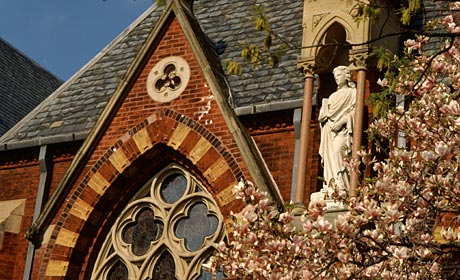
The following reflection is from the late Fr. Bob Smith, a good friend to all of us at Chesterton House.
Two weeks ago, after the 9:30 PM Mass in Sage Chapel, I had an experience that has made me reflect on one of the major challenges to healthy human and spiritual development in student life at Cornell. The incident was trivial, but its implications are not. I was at the door of the Chapel, saying goodbye to students leaving the Mass, when I realized that some cards announcing an important event happening during the week were not being distributed. I asked four students in a row to stay a few minutes to help me pass out the cards. All four immediately said “No” and kept walking away. We had just prayed the Mass together, the request would take about two minutes or less, and their immediate, unreflective reaction was to refuse because they had no time.
I’ve been thinking since that night about the Cornell default position of “NO” to almost any request for time beyond that which a student has not already allocated to some specific use. There is a culture of hard work and commitment to excellence in study and creative work that is one of Cornell’s most admirable aspects. There is also a kind of idolizing of that commitment that produces spiritually dangerous imbalances in students’ decisions about the use of their time, and about the parts of themselves that they neglect because of an obsessive concentration on the demands of work.
The word ‘idol’, though strong, does capture some of the implications of Cornell students’ thinking about the demands on their time made by their work: it plays the role of a kind of God to which they owe absolute obeisance and fromwhich they expect a sort of salvation. Few students would readily think of their image of the demands of their work as a temptation, but an excessive pursuit of excellence in some field can be as spiritually dangerous as any obviously degrading indulgence.
I would like to make a modest proposal. I suggest that every student decide each Sunday on one hour each day (Monday to Friday) during which Cornell does not own you, one hour set aside for the sake of some part of yourself that does not have to do with your studies, exams or class projects. One could do almost anything during that time so long as what you do expresses some real and important part of yourself. And the hour should be deliberately set aside and marked out–a kind of symbolic acknowledgment that, as a human person, each of us transcends even the most important particular task or role. None of us, of course, works all the time. We all idle away an hour or more every day, but this ‘sabbath’ hour would not be only a kind of relaxation, but rather an exercise of freedom.
What would Cornell be like if this ‘sabbath’ hour were to become as much a tradition here in the life of students as the obsession with the demands of work? Would the default and self-protective “No”, gradually become a community and personally life enhancing “Yes”? What do you think?

